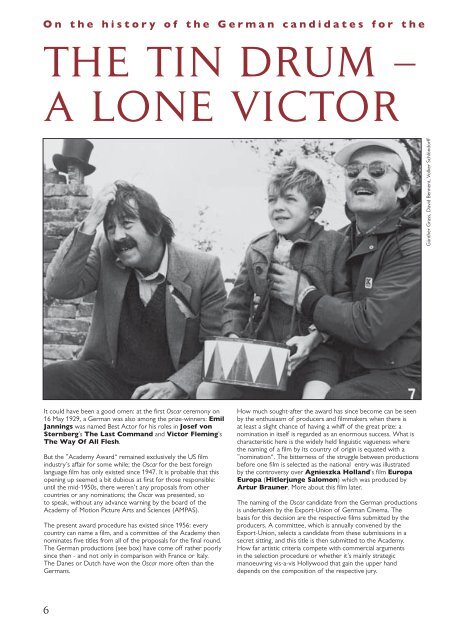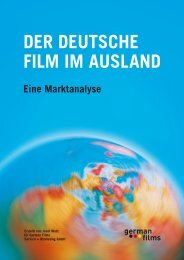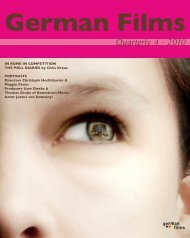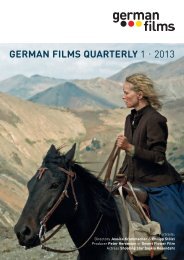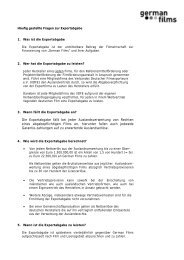Titel Kino 2-2000 - German Films
Titel Kino 2-2000 - German Films
Titel Kino 2-2000 - German Films
You also want an ePaper? Increase the reach of your titles
YUMPU automatically turns print PDFs into web optimized ePapers that Google loves.
On the history of the <strong>German</strong> candidates for the<br />
THE TIN DRUM –<br />
A LONE VICTOR<br />
It could have been a good omen: at the first Oscar ceremony on<br />
16 May 1929, a <strong>German</strong> was also among the prize-winners: Emil<br />
Jannings was named Best Actor for his roles in Josef von<br />
Sternberg’s The Last Command and Victor Fleming’s<br />
The Way Of All Flesh.<br />
But the ”Academy Award“ remained exclusively the US film<br />
industry’s affair for some while; the Oscar for the best foreign<br />
language film has only existed since 1947. It is probable that this<br />
opening up seemed a bit dubious at first for those responsible:<br />
until the mid-1950s, there weren’t any proposals from other<br />
countries or any nominations; the Oscar was presented, so<br />
to speak, without any advance warning by the board of the<br />
Academy of Motion Picture Arts and Sciences (AMPAS).<br />
The present award procedure has existed since 1956: every<br />
country can name a film, and a committee of the Academy then<br />
nominates five titles from all of the proposals for the final round.<br />
The <strong>German</strong> productions (see box) have come off rather poorly<br />
since then - and not only in comparison with France or Italy.<br />
The Danes or Dutch have won the Oscar more often than the<br />
<strong>German</strong>s.<br />
6<br />
How much sought-after the award has since become can be seen<br />
by the enthusiasm of producers and filmmakers when there is<br />
at least a slight chance of having a whiff of the great prize: a<br />
nomination in itself is regarded as an enormous success. What is<br />
characteristic here is the widely held linguistic vagueness where<br />
the naming of a film by its country of origin is equated with a<br />
”nomination“. The bitterness of the struggle between productions<br />
before one film is selected as the national entry was illustrated<br />
by the controversy over Agnieszka Holland's film Europa<br />
Europa (Hitlerjunge Salomon) which was produced by<br />
Artur Brauner. More about this film later.<br />
The naming of the Oscar candidate from the <strong>German</strong> productions<br />
is undertaken by the Export-Union of <strong>German</strong> Cinema. The<br />
basis for this decision are the respective films submitted by the<br />
producers. A committee, which is annually convened by the<br />
Export-Union, selects a candidate from these submissions in a<br />
secret sitting, and this title is then submitted to the Academy.<br />
How far artistic criteria compete with commercial arguments<br />
in the selection procedure or whether it’s mainly strategic<br />
manoeuvring vis-a-vis Hollywood that gain the upper hand<br />
depends on the composition of the respective jury.<br />
Günther Grass, David Bennent, Volker Schlöndorff


